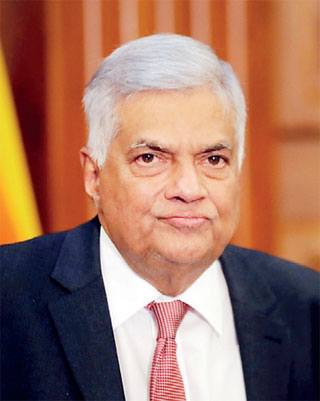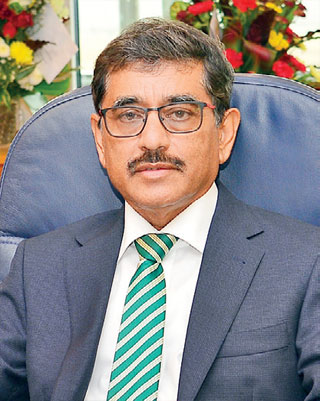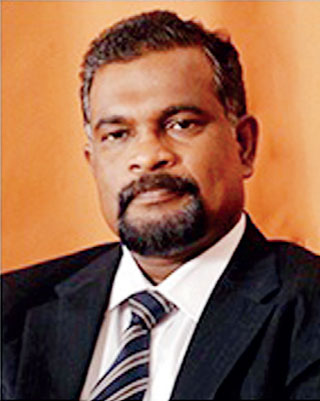Monday Feb 16, 2026
Monday Feb 16, 2026
Friday, 16 September 2022 00:10 - - {{hitsCtrl.values.hits}}

President Ranil Wickremesinghe

Central Bank Governor Dr. Nandalal Weerasinghe

Treasury Secretary Mahinda Siriwardana
 According to World Bank publications: “Heavily indebted poor countries (HIPC) are a group of 39 developing countries with very high levels of poverty and debt burdens, which are eligible for special assistance from the IMF, ADB and the World Bank. This was an initiative of the International Monetary Fund and the World Bank in 1996 and it provides debt relief and low-interest loans to cancel or reduce external debt repayments to sustainable levels, meaning they can repay debts in a timely fashion in the future.”
According to World Bank publications: “Heavily indebted poor countries (HIPC) are a group of 39 developing countries with very high levels of poverty and debt burdens, which are eligible for special assistance from the IMF, ADB and the World Bank. This was an initiative of the International Monetary Fund and the World Bank in 1996 and it provides debt relief and low-interest loans to cancel or reduce external debt repayments to sustainable levels, meaning they can repay debts in a timely fashion in the future.”
Fortunately, Sri Lanka is not in this list of 39 countries though we are now a lower middle-income economy, with a per capita GDP of between $ 1,000 and $ 4,000. Given our manmade forex crisis, only our bilateral friends or multilateral institutions can get us out of this crisis. Isameldin Hamza (University of Buffalo) says, “Foreign aid to low middle-income countries continues to be the main approach for delivering assistance to poor countries to offset shortage of food and health disasters. That aid is usually delivered in forms of direct financial assistance or supply with the needed items. Foreign aid takes different forms, and is primarily facilitated through international donor agencies, mainly to overcome major health problems and scarcity of food.”
Sri Lanka’s biggest problem is the public debt. Given that Sri Lanka’s debt service burden is so high there is little incentive now for Government to invest to boost productivity. To make matters even worse the high interest rates are preventing the private sector from reinvesting to make more money and provide employment. There are certainly some lessons for Sri Lanka from Zambia; how they managed in the face of high inflation and a debt default.
One thing that is clear is that we need to decide on our approach to our future debt management. We need an independent body. In addition, we need to take into account our potential, prospects, the costs of borrowing, and the potential for costs to change in the future when deciding how we must restructure our debt and what we can afford to take on in the future. We also need to build world-class skills in this area.
Solutions
As pointed out at a recent webinar, “Lots of ‘urgent’ measures are needed for a country to have rescuers coming to our aid. Multilaterals will usually look for the existence of competent teams, and also look for strategic interests, which are exactly what will attract them. So will our bilateral friends.
The teams should employ clear communication as to what will really interest them. They also want to be sure that they are not going to lose their capital if there is a laggardly approach to responding to the need for urgent reform. Equally importantly, there must also be clear communication as to what can be done, and what cannot be done with regard to the measures proposed or undertaken.”
SOE partial divestment and smart sizing might be needed to reduce the burden on the taxpayers, corruption must be minimised and expenditure curtailed. Unfortunately our economy has hit such low levels it has become vitally necessary to find funds to be directed into vital sectors of the economy. Private sector will certainly do this if the right environment is created. Collaborative decisions are what we need.
Way forward
International investors who are willing to participate in the recovery of Sri Lanka, will want clear, unambiguous answers on debt sustainability. How does the current-policy impact business and investments? A lot depends on what is strategised and offered to the private investors who might well wish to participate in the recovery of Sri Lanka. It is now essential to implement a new economic model for responsible development, which will ensure support for exports acceleration, new industries, innovation, digitalisation, and talent development and share profits in accordance with the risk borne. However a no care attitude from public institutions (like we have now with some) could delay the economic recovery. A lot will depend on the very experienced President taking the very hard decisions.
(Reference: https://qz.com/zambias-kwacha-is-the-worlds-best-performer-against-the-1849483550.)